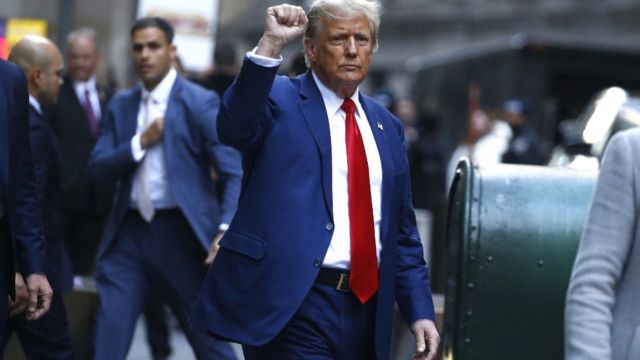Washington Former President Donald Trump was ordered by a New York judge to pay The New York Times about $400,000 in legal fees related to a lawsuit he filed against the newspaper, three of its reporters, and his niece. The lawsuit has since been dismissed.
In 2021, Trump filed a lawsuit against the New York Times, claiming that the publication had colluded with his estranged niece Mary Trump to acquire and release his tax returns. In May 2023, New York Judge Robert Reed rejected the case brought by the Times and its reporters, stating that they were entitled to First Amendment protections and directing Trump to pay for their legal representation.
Reed said on Friday that, considering the intricacy of the case and the attorneys involved, $392,638.69 was “a reasonable value for the legal services rendered.” (A part of Mary Trump’s lawsuit was permitted to move forward, and in June, her request for reimbursement of her legal expenses was turned down.)

A 2018 investigation into Trump’s wealth and taxes by New York Times writers Russell Buettner, David Barstow, and Susanne Craig revealed information from tax returns the former president had refused to make public, citing an audit. The paper later received a Pulitzer Prize for its reporting.
An official with The New York Times stated on Friday that “today’s decision shows that the state’s newly amended anti-SLAPP statute can be a powerful force for protecting press freedom,” alluding to a regulation designed to dissuade baseless defamation lawsuits that try to silence defendants. “The court has sent a message to those who want to misuse the judicial system to try to silence journalists.”
In his $100 million complaint, Trump asserted that the reporters knew of a settlement agreement that prevented Mary Trump from sharing specific papers. He claimed that an “insidious plot” was carried out by the paper and the reporters to get copies of his tax records from his niece illegally.
A request for a response on Friday’s injunction was not immediately answered by a representative for Trump’s legal representative, Alina Habba. Habba stated, “All journalists must be held accountable when they commit civil wrongs,” in response to Reed tossing the complaint last year. The reporters at The New York Times did not deviate from the traditional methods of news gathering that are allowed by the First Amendment.
The judge decided in favor of The New York Times after carefully weighing the arguments and the facts. The ruling required Trump to pay the newspaper’s legal costs in defending against the lawsuit in addition to dismissing his defamation claims. For the former president, the roughly $400,000 reward means serious financial consequences.
Defamation laws and legal Precedents

Public figure defamation claims are difficult by nature and carry a heavier burden of proof. Legal precedents that highlight the value of free speech and shield media outlets from unwarranted lawsuits for covering public persons include the historic Supreme Court decision New York Times Co. v. Sullivan. The judge’s conclusion in this case fits with these established standards.
Effect on Political-Media Dynamics
The decision emphasizes the fine line that must be drawn between protecting press freedom under the First Amendment and holding media companies responsible for their reporting. These kinds of cases add to the ongoing discussion regarding the connection between the media and public people, especially in a time when information is disseminated widely and quickly across a variety of channels.
Financial Repercussions for Trump
The financial fallout from the judge’s ruling is another in Donald Trump’s long list of legal woes in recent years. Even though The New York Times was compelled to receive a sizable payment, this serves as a reminder of the financial costs associated with losing defamation actions. In addition to navigating legal complexity, public people involved in legal disputes with media companies may also have to deal with financial constraints.
In the end, The recent ruling by a judge requiring Donald Trump to reimburse The New York Times for almost $400,000 in legal fees highlights the difficulties and subtleties involved in defamation lawsuits involving prominent people and media outlets. This decision marks a significant turning point in the ongoing discussion concerning the bounds of free speech, responsible journalism, and the legal obligations of public personalities and media institutions. Legal precedents continue to change the terrain of media-political interactions.
